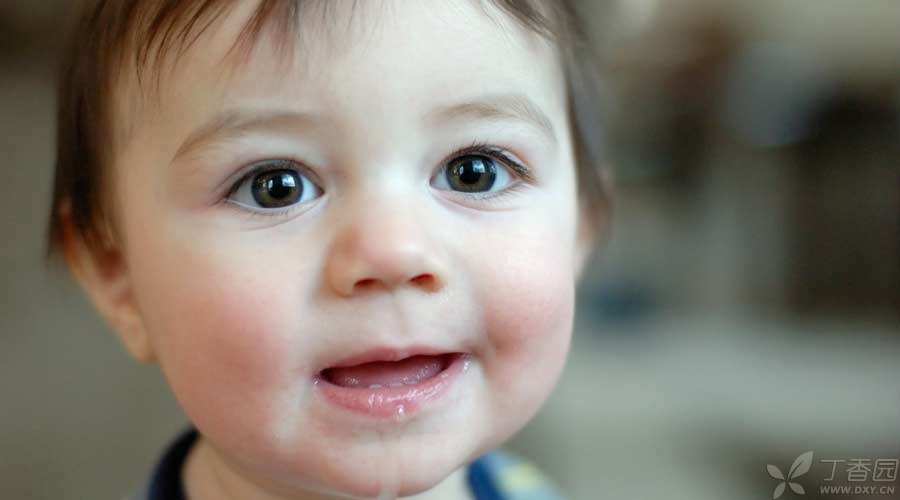
In the baby’s growth cycle, there will always be a time when saliva will flow especially much. The saliva ticking baby, although let a person love unceasingly, but also let a person feel vaguely worried.
Why does the baby always drool? Is the baby drooling a natural reaction of the body? Saliva paste on the face for a long time makes the small face dry and itchy. What should I do?
All questions, let Dr. Clove to answer.
Why does the baby drool?
Once you enter the teething period of 4 ~ 6 months, the baby’s saliva secretion valve will open. According to < < Sears Health Parenting Encyclopedia > >, although the vast majority of the reasons are due to the baby began to grow small deciduous teeth, but in fact, any stimulation in the oral cavity will cause the baby’s saliva to fly.
Generally speaking, drooling is a normal physiological phenomenon for babies under one year old, and there are roughly four reasons:
1. Eat supplementary foods containing starch,
Fast-growing babies can already start to eat supplementary foods containing starch at the age of 4 months. Starch in the supplementary foods can stimulate the secretion of amylase in saliva, thus causing saliva to increase.
Step 2 Suck your fingers
Baby sucking fingers, oral cavity can increase the secretion of saliva after being stimulated. At the same time, the baby’s oral cavity is shallow and small, and the swallowing function is not yet fully developed, which leads to the baby’s difficulty in swallowing more secreted saliva, and the saliva will [flood Jinshan].
Step 3: Teeth
Teeth can stimulate the secretion of salivary glands and cause saliva to increase.
4. Incomplete swallowing function
The baby is not yet mature and its swallowing function is not perfect. Once saliva accumulates in the oral cavity, the baby may flow out before swallowing.

What should we pay attention to?
Due to the reason of teething, the baby will show [vigorous saliva period] at about 7 ~ 18 months old. With the development of swallowing function and the emergence of deciduous teeth, the phenomenon of drooling will generally stop at the age of 2 ~ 3. Due to the difference in development status, the phenomenon of drooling in individual babies may be slightly delayed, and parents should pay attention to observation.
Just now, I said the normal reasons. Now, let’s talk about the saliva of the baby. What other reasons should parents pay attention to:
1. Cerebral palsy or congenital dementia
Baby drooling usually stops at the age of two to three. If the baby is two years old, besides drooling, there are also phenomena such as slow language development and inability to walk, so be careful about mental development disorders.
2. Oral ulcer
If there is oral ulcer, the secretion of the baby’s saliva will also increase significantly, so attention should be paid when the baby is found crying or licking a certain position in the mouth repeatedly when eating.
3. Respiratory infection
When the baby has respiratory infection, drooling will also occur. Usually, drooling caused by this reason may be accompanied by cough, fever and other symptoms.
4. Supplementary foods are added too late.
Some parents think that breast milk or milk is better than supplementary food, so even when the baby is old enough to add supplementary food, it is still fed with milk, resulting in the baby’s tongue and swallowing function not getting the proper exercise.
How to carry out nursing?
If the baby’s saliva is harmful to what, it is probably [saliva rash]. This is because saliva contains substances that digest food, which can destroy the stratum corneum on the skin surface, and the skin will immediately become dry and vulnerable to germs, forming [saliva rash].
So once the baby enters the saliva flood period, how should he be cared for as a parent?
Step 1 Cut your nails short
Skin pruritus, the baby will inevitably scratch. Sharp little nails are easy to poke the baby’s delicate skin, and the dirt hidden in the nails may also bring new infection to the baby’s skin.
Step 2 Keep clean
Once you find your baby drooling, you can gently wipe it with a clean wet towel and wipe it with nontoxic grease used by infants to protect your baby’s skin. If saliva flows to clothes, pillow towels, quilts and other places, you should also pay attention to frequent change to prevent bacteria from breeding.
STEP 3 Pay Attention to Tricks
Many adults like to pinch the baby’s cheeks when teasing the baby. Little imagine, there are salivary glands in people’s cheeks. Frequent touch will cause repeated stimulation to salivary glands, thus causing saliva secretion to increase.
In addition to good nursing, the baby’s swallowing and oral coordination ability can also be enhanced through training, for example, let the baby imitate the swallowing of parents’ saliva; Feed the baby egg cake to improve the baby’s chewing ability and eliminate the discomfort caused by teething. Through these trainings, the small mouth can be opened and closed freely, so that the small deciduous teeth can sprout smoothly, and the annoying [small silver thread] hanging on the baby’s mouth will be swept away.
Responsible Editor: Chuyang
